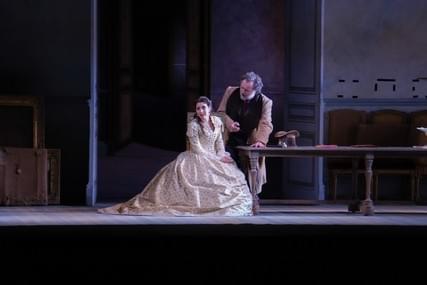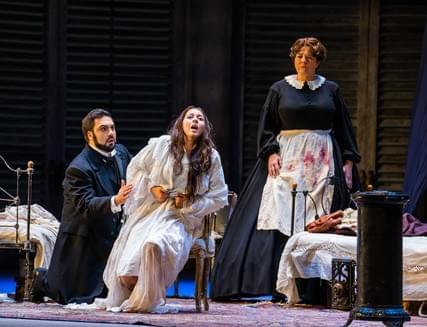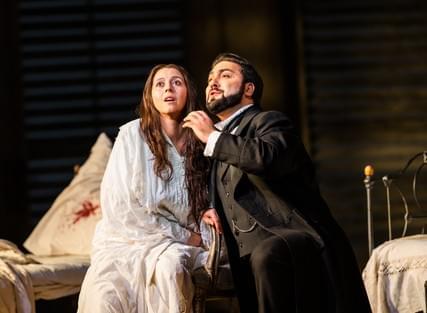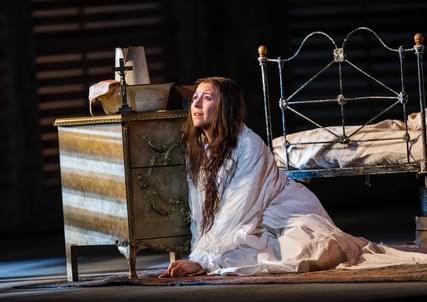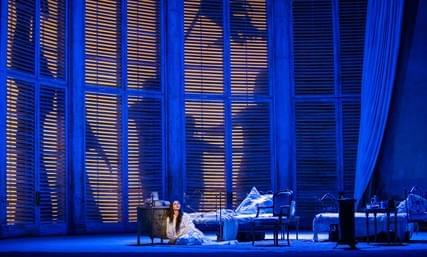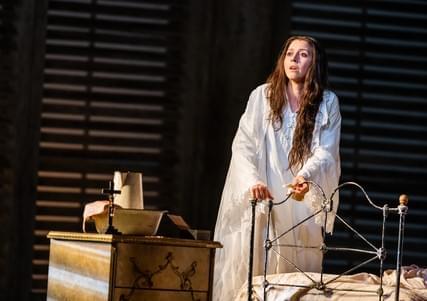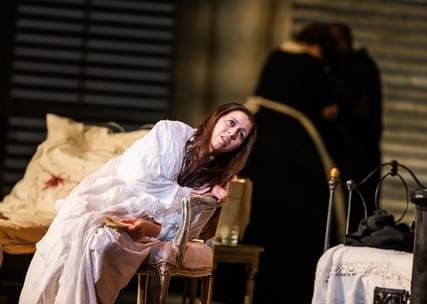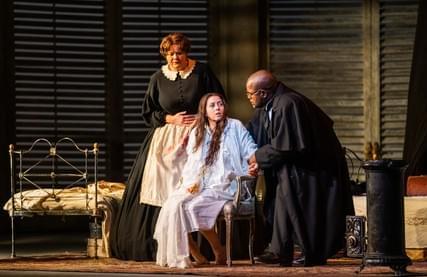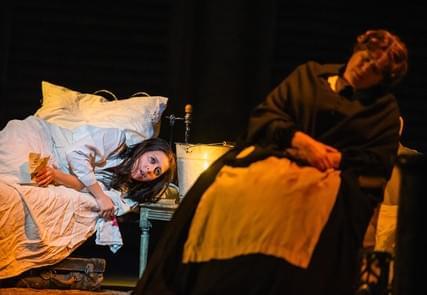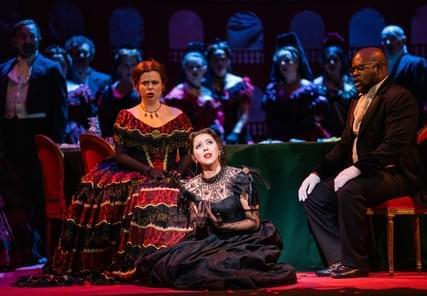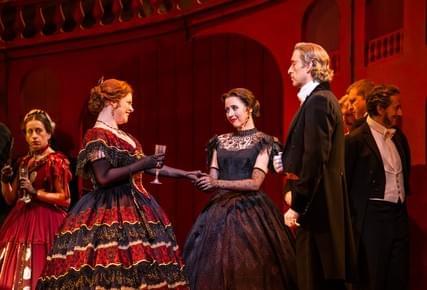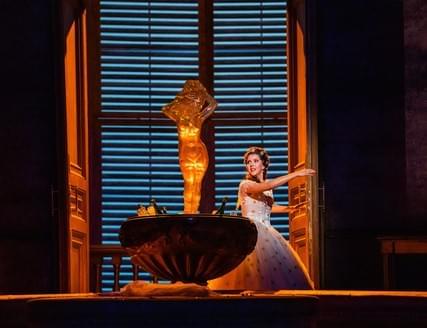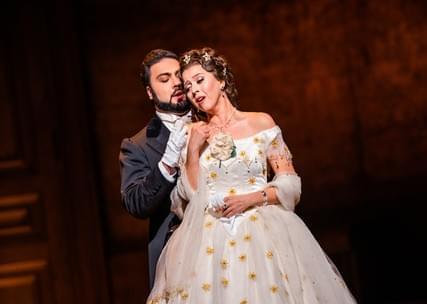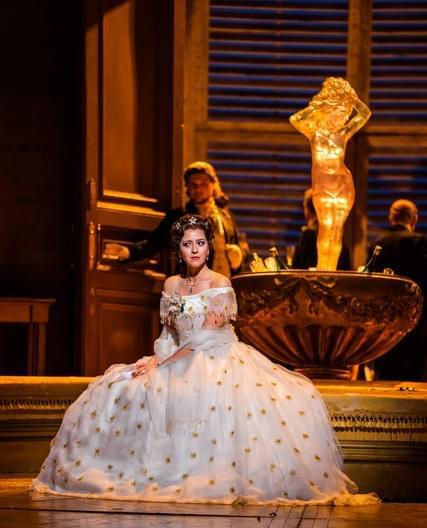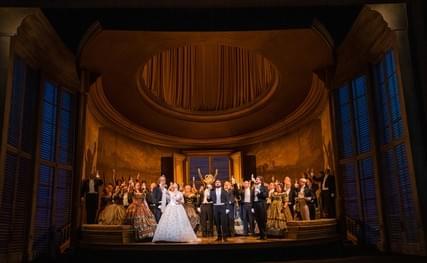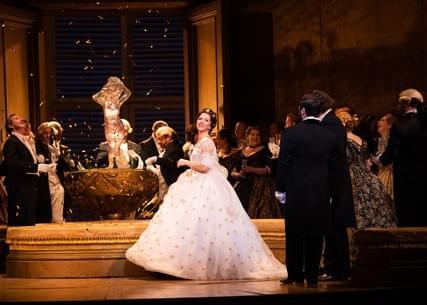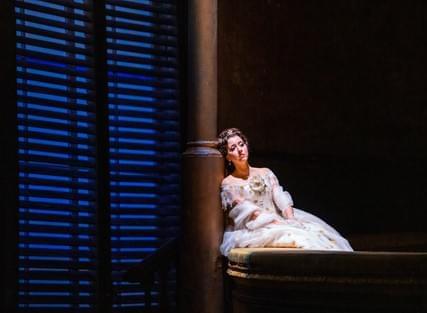La traviata
Music by
Giuseppe Verdi
Cast
| Violetta Valery | Lisette Oropesa | |
| Alfredo Germont | Liparit Avetisyan | |
| Giorgio Germont | Christian Gerhaher | |
| Annina | Renata Skarelyte | |
| Doctor Grenvil | Blaise Malaba | |
| Flora Bervoix | Stephanie Wake-Edwards | |
| Baron Douphol | Yuriy Yurchuk | |
| Gastone | Egor Zhuravskii | |
| Marqués D' Obigny | Jeremy White |
Conductor
Antonello Manacorda
DirectorRichard Eyre
About
Richard Eyre's beautiful production provides the perfect setting for Verdi's opera about a courtesan who sacrifices all for love.
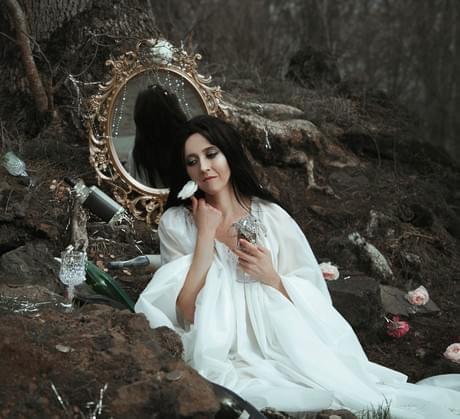
La traviata recording a critical success
La traviata album a critical success!
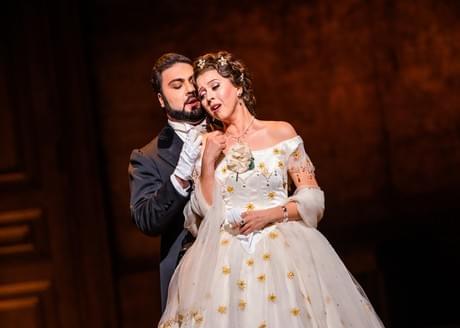
Interview - Platea Magazine - 2021
Lisette speaks to Platea Magazine about her upcoming Zarzuela Concerts
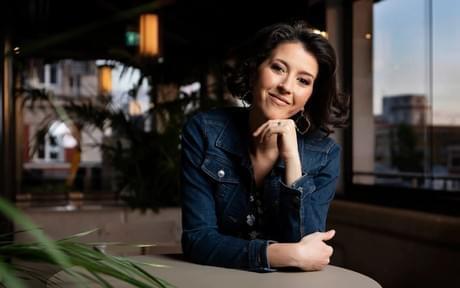
Lisette is interviewed in the Daily Telegraph
Lisette is interviewed by the Daily Telegraph

🍁 Lisette's Fall Newsletter!
Prague, Parma, London, Vienna, Milan, Paris, Luxemburg, Essen, Madrid and Seville!
Reviews
La traviata review — a star shines in the Royal Opera’s Verdi revival
Bob Crowley’s sets, famously marked by heavily architectural semi-circular structures choked with objects that get in the way (banquettes, a gambling table, hoop skirts), never seemed to pin Oropesa to the spot as it did with other performers. In Act I she vibrated with life and young innocence, hitting the coloratura heights in the climactic Sempre libera without the brilliance ever seeming forced. The open warmth of her tone, lack of affectation and gentle half-voice allowed her to easily display unfettered hurt and vulnerability, much needed as the libretto carved from the Alexandre Dumas play La Dame aux camélias presses on.None— Geoff Brown • The Times
Lisette Oropesa's Violetta proves to be one of the greats at Covent Garden
last night, we were to hear Lisette Oropesa, a soprano at the top of her game whose Violetta blew away audiences in Madrid last year as well as at The Met. She did not disappoint. The keystone of her performance was a truly formidable level of technique. Whatever technical aspect you talk about – breathing, placement of vowel sounds, details of Italian diction, legato, timbre, emphasis of bel canto phrasing or many more – Oropesa had them all under control, with supreme confidence in her ability to make her voice do anything she wanted it to. Technique brings freedom: the freedom to choose the exact interpretation of every phrase and to know that it’s going to come out exactly the way she wants it to. Opera singers are constantly making difficult decisions and Oropesa seemed to make every one in a way that was musically and dramatically felicitous. I’ll give just one example: in “Addio, del passato”, when Violetta bids goodbye to the past from her deathbed, she gasps for breath between phrases. How loud to make the gasp? Too loud and you break the musical flow, maybe sounding contrived. Too soft and you sound too healthy. Oropesa nailed the balance exactly right – as she did in hundreds of other places. With that musical freedom came an ability to make every word of the role count, whether it’s the glitter of Act 1, the cheerfulness turning to despair of Act 2 scene 1, the impossibility of an exit from her grief at the card playing scene or the inevitability of her terminal illness of Act 3. Her performance convinced at every point even as we enjoyed the music.None— David Karlin • Bachtrack
La Traviata “Exhilarating performance by Lisette Oropesa”
Oropesa shows total command of her vocal instrument, thrilling with her expansive dynamic and expressive range. Dramatically, she is at her best in the heart-rending final act, as Violetta in the final stages of consumption, clinging to the hope of a final meeting with her beloved Alfredo (Liparit Avetisyan).None— Inge Kjemtrup • The Stage
La Traviata review – Oropesa and Avetisyan are exceptional in impassioned Verdi
As with her Gilda, Oropesa welds sound with sense to create a characterisation of great depth and subtlety. Vocally, Violetta holds no terrors for her: the reckless coloratura of Act I is admirably secure and capped with a dazzling high E flat; the lyricism with which she yields to the moral demands of Christian Gerhaher’s Germont is at once heartbreaking and exquisite; and the emotional and physical anguish of the final scenes are all the more powerful for being etched with such unsentimental restraint. Suggesting fragile beauty on stage, she realises the breathlessness of tuberculosis – and, tellingly, the panic that accompanies it – with unsparing vividness, and throughout we really do believe in the intensity of her feelings for Alfredo and their power to transform and overwhelm her.None— Tim Ashley • The Guardian
A standing ovation for Lisette Oropesa in the Royal Opera House’s revival of La traviata
In Act 2, Oropesa found a little more colour and warmth, making us feel, through her command of the legato line and her sensitivity to the text, her very human struggle to deny mortality and fate. She paced the tension brilliantly, revealing the anguish of love relinquished and a heart broken. Perhaps she cannot rely on an innate lyrical quality to convey Violetta’s passion and despair, but Oropesa is a natural singing-actress, and the pathos of Act 3 was heart-wrenching. The expressive details were emphasised but not exaggerated, even if she looked as hollowed out and haunted as a phantom. Indeed, this fragile Violetta was so evidently close to death that it was painful to endure her memories and her prayer, even as it was beautiful to hear them. In ‘Addio del passato’, despite the stunning soaring lines, somehow Oropesa seemed to intimate a body on the cusp of breathless collapse. Even the depiction of the momentary, delusory belief in recovery, known as spes phthisica, was more convincing than I remembered from previous performances, the surge of adrenaline sending the languishing Violetta spinning around the room, only to slump, lifeless, into Alfredo’s well-timed embrace.None— Claire Seymour • Opera Today
Le Royal Opera House continue de raviver La Traviata de Richard Eyre
Lisette Oropesa suspend le souffle du public chaque fois qu'elle ouvre la bouche et l'assistance aurait visiblement souhaité un bis pour "Sempre libera". Le contrôle des aigus et suraigus parachève celui de la ligne vocale au point de ne plus sembler surprendre. Mais ce rôle permet aussi d'apprécier le registre grave mélodieux de la soprano. Les deux rôles chantés par Oropesa cette saison à Covent Garden (Violetta et Gilda) ont en commun d'opérer une transition au cours de la soirée entre les qualités virtuoses et une concentration vocale à l'intensité du drame, moins brillante et plus tragique.Lisette Oropesa leaves the audience breathless every time she opens her mouth, and clearly, the audience would have loved an encore for "Sempre libera". The control of high notes and falsettos completes her vocal line control to the point of no longer being surprising. But this role also allows for an appreciation of the soprano's melodious low register. The two roles sung by Oropesa this season at Covent Garden (Violetta and Gilda) have in common a transition over the course of the evening between virtuosic qualities and a vocal concentration with the intensity of the drama, less brilliant but more tragic.— Mark Everist • Olyrix
Lisette Oropesa’s Violetta makes this umpteeenth revival of the Royal Opera’s La traviata unmissable
From then on there was greater warmth, emotion, passion, heartbreak and despair as Oropesa’s commitment to the character became evident and she totally won over the audience to deserve the standing and cheering there was at her curtain call. Her ‘Alfredo, Alfredo, di questo core non-puoi comprendere tutto l’amore’ at the end of Act II was dignified and deeply affecting. Later when she relinquishes her love for Alfredo to the girl he will eventually marry (‘Prendi: quest’è l’immagine’) it was heartrending.None— Jim Pritchard • Seen and Heard International
La Traviata REVIEW: Lisette Oropesa breathes new life into Verdi's most popular opera
I cannot remember when I last saw the entire audience at the Royal Opera House rise to their feet to applaud a singer, but rarely can a full-house standing ovation have been better merited than the one given to Cuban-American soprano Lisette Oropesa on the opening night of Verdi’s La Traviata on 27 October.This singer has everything: a beautiful voice, flexible enough to convey great extremes of emotion, superb acting ability, and the ability to dominate the stage and captivate the audience totally. Even more remarkably, this was the 17th revival of Richard Eyre’s glorious 1994 production of Verdi’s most popular opera, yet thanks to Oropesa’s stunning performance, it looked fresher than ever.None— William Hartston • Daily Express
Lisette Oropesa Dazzles as Violetta in La traviata at the Royal Opera House, Covent Garden
Oropesa is a Violetta with everything as her intricate portrayal of the character is just as mesmerising as her superlative singing. The various situations, moods and states of health that Violetta finds herself in mean that the demands placed on the singing and acting are constantly changing, yet Oropesa remains thoroughly convincing from start to finish. In arias such as ‘Sempre libera degg’io’ the underlying sumptuousness in her sound is complemented by complete mastery of technique and phrasing so that it positively glistens and gleams. On the other hand, in ‘Addio, del passato bei sogni ridenti’, the inherent security in her voice is paradoxically used to convey the most convincing image of frailty. Her acting is also effective as even her arm gestures are in keeping with the wider picture, whether palms are facing outwards so that arms follow the curve of her dress, or hands are coming together as if the emotion she is feeling is so strong she can practically cradle it.None— Sam Smith • Opera Online
La traviata @ Royal Opera House, London
Given that there are six sopranos scheduled to sing Violetta this run, that will be of paramount importance. Having caused a sensation with her superbly sung Gilda (Rigoletto), which opened the season, Lisette Oropesa returned to perform Violetta for the first time at Covent Garden, and rightly brought the house down. Most of the world’s most illustrious sopranos have graced this staging over the years, but you’d have to go back a long way to find one with such prodigious talents as Oropesa, who embodies the role so fully. With a rock-solid technique, she sounded completely at ease across every facet of the role – thrilling coloratura in ‘Sempre Libera’, dispatched with pinpoint accuracy and perfectly tuned runs, wonderfully spun lines, perfect breath control – and acted the role as if her life depended on it. Deeply moving in her Act II ‘Dite alla giovine’, heart breaking in the final act’s ‘Addio del passato’, she capped her thrilling interpretation with an emotionally shattering ‘Parigi, o cara, noi lasceremo’, alongside her former lover, Alfredo, which left few, if any, dry eyes in the house. Without a doubt she is one of the finest, most complete Violettas to grace this staging in its almost 30 year history.None— Keith McDonnell • Music OMH
Londra, Royal Opera House – La traviata (con Lisette Oropesa)
Ne risulta un ritratto completo dell’evoluzione del personaggio di Violetta, sicuramente una delle più efficaci nella lunga storia di questo allestimento. Nel primo atto, Oropesa mostra una bella padronanza tecnica dello strumento con un buon controllo del fiato e senza nessuno sforzo nel dispiegare le fioriture di “Un dì felice, etera”, così come le agilità della cabaletta “Sempre libera” dove centra il Mi bemolle sopracuto, mentre in “Follie! Follie! Delirio vano” Oropesa trasmette quella frenesia e quel turbamento latente che agitano il personaggio. Lasciatasi alle spalle le difficoltà tecniche del primo atto, la voce inizia ad acquisire maggior colore e spessore interpretativo. Dopo il confronto con Germont, Oropesa esordisce in “Ah, dite alla giovine” con una lunga e sostenuta mezzavoce in piano dal legato curatissimo (uno dei momenti musicali più belli della serata), a cui si oppone poi la disperazione di “Morrò! Morrò!”, enfatizzata da un battito di pugni sul tavolo.This results in a complete portrait of the character evolution of Violetta, certainly one of the most effective in the long history of this production. In the first act, Oropesa demonstrates beautiful technical mastery of her instrument with good breath control and effortlessly unfurls the embellishments of "Un dì felice, eterna," as well as the agility of the cabaletta "Sempre libera" where she hits the high E-flat, while in "Follie! Follie! Delirio vano," Oropesa conveys the frenzy and latent turmoil stirring in the character. Having left the technical difficulties of the first act behind, the voice begins to acquire greater color and interpretive depth. After the confrontation with Germont, Oropesa makes her entrance in "Ah, dite alla giovine" with a long and sustained mezza voce in a delicate legato (one of the most beautiful musical moments of the evening), which is then opposed by the despair of "Morrò! Morrò!" emphasized by a fist pounding on the table.— Pietro Dall'Aglio • Conessi all'Opera
I’ve rarely heard a Covent Garden crowd explode like they did at Royal Opera's latest Violetta
Lisette Oropesa is the Violetta of your dreams: spirited, dignified, and singing with the sweet, liquid lyricism of a blackbird before daybreak. I’ve rarely heard a Covent Garden crowd explode like they did at the end of Oropesa’s ‘Sempre libera’, and even more rarely with such good reason.None— Richard Bratby • The Spectator
The perfect Traviata in the Royal Opera House
Dabei wird es wohl schwierig sein, die makellose Leistung von Lisette Oropesa zu übertreffen. Die amerikanische Sopranistin ist ein Phänomen, Publikumsliebling und eine der großen Verdi-Sängerinnen der Gegenwart. Dies konnte sie bereits vor einigen Wochen als Gilda in Rigoletto beeindruckend demonstrieren. Was zeichnet ihre Violetta aus? Eine atemberaubende Klarheit in der Höhe, technische Perfektion und die Fähigkeit, die Partie bis in die kleinsten psychologischen Verästelungen auszudeuten. Von der fliederhaften Leichtigkeit des Duetts „Un dì, felice, eterea“ bis zum letzten, schmerzhaften Aufbäumen im letzten Akt („Addio del Passato“) gelingt es ihr, Höhen und Tiefen ihrer Figur perfekt darzustellen.It will likely be challenging to surpass the flawless performance of Lisette Oropesa. The American soprano is a phenomenon, beloved by audiences, and one of the great Verdi sopranos of our time. This was something she impressively demonstrated a few weeks ago as Gilda in Rigoletto. What makes her Violetta stand out? A breathtaking clarity in the high notes, technical perfection, and the ability to interpret the role down to the smallest psychological intricacies. From the lilac-like lightness of the duet "Un dì, felice, eterea" to the last, painful defiance in the final act ("Addio del Passato"), she succeeds in perfectly portraying the highs and lows of her character.— Andreas Schmidt • Klassik Begeistert
Performance History
Lisette has given 51 performances as Violetta Valery.
2026
Metropolitan Opera2025
Bayerische Staatsoper
Staatsoper Unter den Linden2024
Wiener Staatsoper
Opéra National de Paris2023
Wiener Staatsoper
Teatro dell'Opera di Roma
Arena di Verona2022
Arena di Verona
Bayerische Staatsoper2021
Teatro dell'Opera di Roma2020
Gran Theatre del Liceu
Teatro Real
Metropolitan Opera2019
Arena di Verona
Greek National Opera2015
Opera Philadelphia



